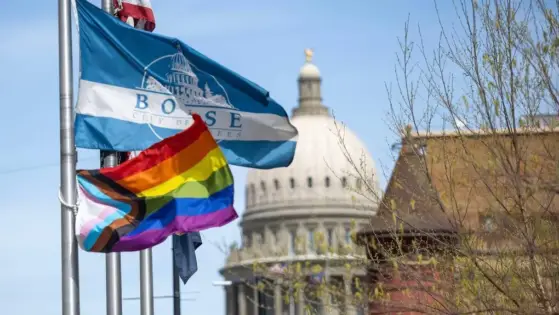Do you believe in gay virgins?
This is the question at the heart of the matter regarding the Oregon Measure 36 voter-initiative that appears on this fall’s ballot. That ballot initiative seeks to amend Oregon’s Constitution with language that reads: only marriage between one man and one woman is valid or legally recognized as marriage.
This follows in the wake of a controversial move by Multnomah County commissioners to issue marriage licenses to same-sex partners. Those commissioners were moved to action by Section 20 of the Oregon Constitution that reads: No law shall be passed granting to any citizen or class of citizens privileges, or immunities, which, upon the same terms, shall not equally belong to all citizens.
So what does this have to do with the gay virgins? I ask the question because it uncovers the root of the problem, which is this: are gay people born that way or is it a choice they make?
If a person is born gay, then they know in their heart that they are gay before they ever have their first sexual experience. Sexual acts do not define their homosexuality; rather, their longings, desires, and mutual compatibility define their orientation. They are a class of citizens, and as such, deserve the same benefits marriage law grants to heterosexuals based on Section 20.
I believe in gay virgins. I have many gay and lesbian friends whom I’ve asked, “When did you know you were gay?” to which they responded, “When did you know you were straight?” Without exception, each of my friends has told me they knew very early in life that they were different. If you think back to your junior high and high school years, you knew that some of your classmates were “different”. Do you think they were choosing to be “different” just for the extra attention from the school bullies?
One of the ways proponents of Measure 36 try to defend the idea that it is not discriminatory is by saying that it doesn’t prevent anyone from having a committed relationship. That’s correct. Straight couples and gay couples are free to fall in love, go steady, share an apartment, and raise their own children. But only the straight couple can get the legal recognition of that partnership, the protections of shared property, medical visitation, inheritance, tax status and dozens more rights and benefits of marriage.
Suppose Heather has two mommies and one mommy dies. The other mommy can’t inherit the estate of the first mommy, can’t receive pension or insurance benefits, and may even lose the custody, leaving Heather to the foster care system. Voting Yes on 36 harms the children of gay people by excluding them from the protection of family law.
To say Measure 36 does not hinder benefits is ludicrous. Proponents will argue, as they did in a recent Town Hall Meeting broadcast on KATU News in Portland, that gay couples can secure legal protections through contracts and wills. Of course, that assumes the gay couple has the money to afford the lawyers necessary to draft and process such documents. I guess Measure 36 is not discriminatory toward rich gay couples.
That stance means that the proponents of Measure 36 are not against gay couples having the rights and benefits of marriage, just as long as they jump through a whole bunch of expensive hoops to get it. So what exactly are they defending then? It’s OK for gay couples to cohabitate, make love, have children, and enjoy all of the rights and benefits of marriage, just so long as they don’t call it “marriage”? Is this what this Measure 36 is all about, protecting a word? Besides, the contracts and wills required are numerous and complex, expensive documents that do not provide the same level of rights and benefits. Fifty years ago our society evolved to the point where we realized that “separate but equal” is anything but.
Another way the proponents try to garner votes for Measure 36 is by invoking the “slippery slope” argument that goes something like this: “If it is fair for two men or two women to marry, why not three, or five, or 17?” I fail to see what polygamy has to do with gay marriage. Why couldn’t polygamists make their argument based on the current state of heterosexual marriage by saying, “If it is fair for a man to have one wife, then why not three, or five, or 17?”
Some proponents try to take the silly argument even farther by warning that gay marriage will usher in not only polygamy, but incest and bestiality. The problem with the argument is that incest, polygamy, and bestiality are illegal. Voting no on 36 doesn’t mean that all those laws are repealed. Straight people will not be able to marry their sister, their dog, or three other partners, and neither will gay people.
I think the founders of Oregon got it right when they drafted Section 20 of the Oregon Constitution. Laws should apply equally to all citizens – even gay people. By voting yes on Measure 20, you are condemning a gay virgin to spend the rest of his or her life living with a committed partner in an undefined legal relationship that leaves their family unprotected in matters of inheritance, child custody, property rights, health care decisions, estate planning, and funeral arrangements.
Supporters of Measure 36 need to get over their own personal distaste for homosexuality. You can continue to be disgusted by gay people, you can continue to preach that gays are going to hell, and you will never be forced to marry gay couples in your church. But in America and Oregon we have a tradition of championing the rights of unpopular minorities. Gay people aren’t going away, so we should treat them as fairly as anyone else. It would be a sad chapter in our history if we tainted our most sacred political document by declaring that only some people’s love is worthy of legal recognition.






